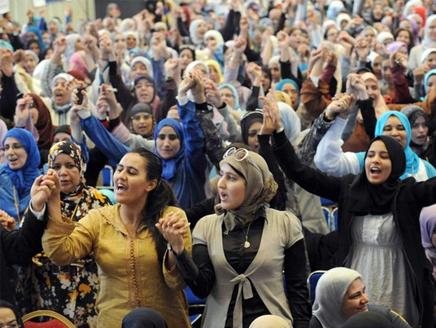- Washington “follows with interest” Morocco’s openness onto Africa (John Kerry)Posted 11 years ago
- The trial of South African Paralympic champion Oscar Pistorius opened in Pretoria on Monday.Posted 11 years ago
- USA welcomes efforts of King Mohammed VI in MaliPosted 11 years ago
- Egypt’s population reaches 94 millionPosted 11 years ago
- Mugabe celebrates his 90thPosted 11 years ago
- Moroccan Monarch to Build a Perinatal Clinic in BamakoPosted 11 years ago
- King Mohammed VI handed a donation of bovine semen for the benefit of Malian breeders.Posted 11 years ago
- Moroccan King’s strategic tour to Africa: Strengthening the will of pan African Solidarity and stimulating the south-south cooperation mechanisms over the continentPosted 12 years ago
- Senior al-Qaida leader killed in AlgeriaPosted 12 years ago
- Libya: The trial of former Prime Minister al-Baghdadi AliPosted 12 years ago
Morocco: November 25th elections offer a glimmer of hope for a new political map
 Morocco launched its campaign for November 25 legislative elections Saturday, with a sharp running struggle between the strong liberal coalitions named G8 and moderate Islamists.
Morocco launched its campaign for November 25 legislative elections Saturday, with a sharp running struggle between the strong liberal coalitions named G8 and moderate Islamists.But, despite of the vigilant reactions of all political parties on the first day of the campaign, there is less fear from of a low turnout in these upcoming legislative votes.
In the last parliamentary elections in 2007 turnout was a mere 37 percent, a sign of Moroccans’ lack of interest in public affairs, but within the proactive reforms initiated along the last six months by the Moroccan sovereign Mohammed VI, observers expect impetus awareness of people to decide their next political configuration after the constitutional reforms.
The election comes less than five months after a July 1 referendum on a new constitution which had been proposed by King Mohamed VI as regimes in neighboring Arab countries were being swept away by public anger.
The amended constitution was to make the kingdom more democratic, strengthen parliament and the prime minister while leaving the outstanding role of the monarch untouched.
Under the new constitution the king will appoint the prime minister from among the party which garners the most votes.
Morocco’s February 20 reform movement of mainly youthful independent protesters, left-wing activists and Islamic fundamentalists has called for a boycott of the upcoming vote. But many of February 20 reform movement have expressed that the coming legislative elections possibly will be an energetic opportunity for the implementation of a new vigorous political environment that would help in the steadfast of unsettled reforms mainly in the areas of job market, social justice, and education.
Said, 26 years old , civil engineering graduate – but still looking for a job- in Casablanca has express brightly what his age-group might expect and act towards the vote:
“Although I know what is question is actually about, I will play it straight. Vote for the person I think will make the best representative of my city, my generation at the top legislative instance in the country. I will no more abandon my vote. Since, the empty sit will just provide conservative to control political decision in the country. And when I say, the future of the country; it is in fact mine. So let’s say it otherwise, I Vote so I Think, I Think so I Am a Citizen”.
For the first time experts believe that the moderate Islamist Justice and Development party (PJD) — the main opposition party with currently 47 deputies — has a chance of winning but could not rule the government, if other parties reject to make any deal.
Overall around 30 parties are vying for the 395 seats in parliament — 70 more than in 2007, all of which are reserved for women and younger deputies in a bid to give an assembly so far a more modern look.
Of 13 million Moroccans eligible for voting 57 percent are 35 or younger.
A total of 1.521 lists were filed for 92 local electoral divisions that is an average of 16 lists by constituency.
Data shows that 1.464 of the candidates are men, that is a rate of 96,25%. About 57 lists have women as chief candidates, that is 3.75%. Concerning the renewal of the elites, the rate of new candidates among the applicants for local lists amounts to 87,57%, while the rate of elected deputies chief candidates, running in the new elections, represents 12.43%,.
From a generational point of view, 36,03% of candidates are under 45 years old; 36,16% are aged between 45 and 55 years while 27,81% have over 55 years.
Provincial administrative authorities responsible for receiving statements of candidacy rejected over 25 applications for reasons related to the ineligibility to vote.
Political parties will receive a total of 220 million dirhams from the state. The government has increased the maximum amount that candidates can spend from 250,000 dirhams to 350,000 dirhams. But the new provisions also require candidates to draw up a document outlining details of their funding sources and a breakdown of the amount spent, accompanied by supporting evidence.
From the other side, the National council of Human rights and the Special Commission for the Accreditation of Election Observation have accredited under law 30.11, laying down the terms and conditions of neutral and independent election observation, 16 national and international bodies, mandating about 4000 observers.
